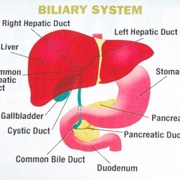Anyone who has ever known a pancreas cancer patient, especially a blood relative, is likely to be interested in research on this devastating disease. According to a recent medical journal article, there were 42,470 new cases and 35,240 deaths in the United States in 2009. A study of 799 newly diagnosed pancreas cancers found that only 18 percent were candidates for surgical treatment. This is considered the only possibility for a cure, and is effective only if the tumor is detected in the very early stage.
My mother-in-law died of pancreas cancer, so I've seen the course of the disease firsthand. Mom decided to get chemotherapy, which was supposed to increase her quality of life during her predicted 6 to 12 month survival time. She died 8 months later, after losing over half her body weight and suffering great mental and physical distress.
One of my friends lost both his father and his brother to pancreas cancer. According to Reference 1, this gives him a Moderate risk level of developing the disease himself, 5- to 10-fold what the average American faces. The High risk level, greater than 10-fold, is made up of people with three or more relatives with pancreas cancer plus certain genetic factors.
The U.S. Preventive Services Task Force recommends against routine screening for pancreas cancer at present. For patients at high risk, the following imaging techniques are available:
1. Magnetic retrograde cholangiopancreatography (MRCP/MRI),
2. Endoscopic retrograde cholangiopancreatography (ERCP),
3. Computed tomography (CT) scan,
4. Endoscopic ultrasound.
A major goal of research is a relatively simple test, such as a blood test, for a biomarker for pancreas cancer. A purified monoclonal antibody called PAM4 shows the most promise, as reported in the 2010 ASCO Gastrointestinal Cancers Symposium. On the clinicaltrials.gov site, I found 942 currently listed trials related to pancreas cancer.
Funding for pancreas cancer research lags far behind funding for more “popular” causes such as breast cancer. However, there are some organizations dedicated to pancreas cancer, including the Hirshberg Foundation, at www.pancreatic.org.
On a personal basis, I get mammograms and Pap smear tests every year, and I've had my first colonoscopy. I wish I could get a blood test for cancer in general. While that may not be possible, I applaud the researchers who continue to search for early detection techniques.
References:
1. Bussom S et al, “Methods and rationale for the early detection of pancreas cancer: Highlights from the 2010 ASCO Gastrointestinal Cancers Symposium. Orlando, FL, USA, January 22-24, 2010”, J Pancreas (Online) 2010 Mar 5; 11(2): 128-130.
2. National Cancer Institute information:
http://www.cancer.gov/cancertopics/types/pancreatic
3. Clinical trials:
http://clinicaltrials.gov/ct2/results?term=pancreas+cancer
Linda Fugate is a scientist and writer in Austin, Texas. She has a Ph.D. in Physics and an M.S. in Macromolecular Science and Engineering. Her background includes academic and industrial research in materials science. She currently writes song lyrics and health articles.






Add a CommentComments
There are no comments yet. Be the first one and get the conversation started!